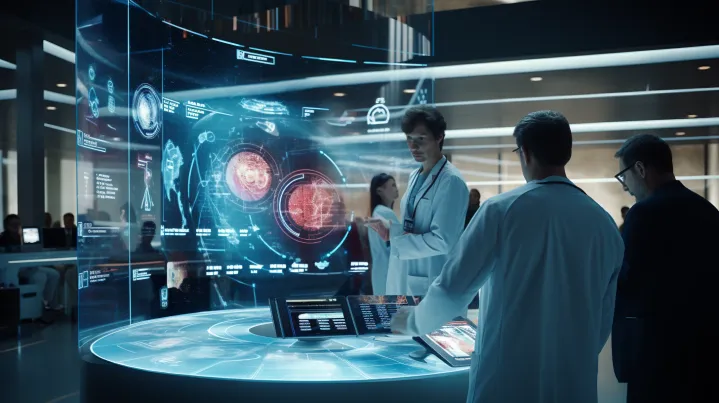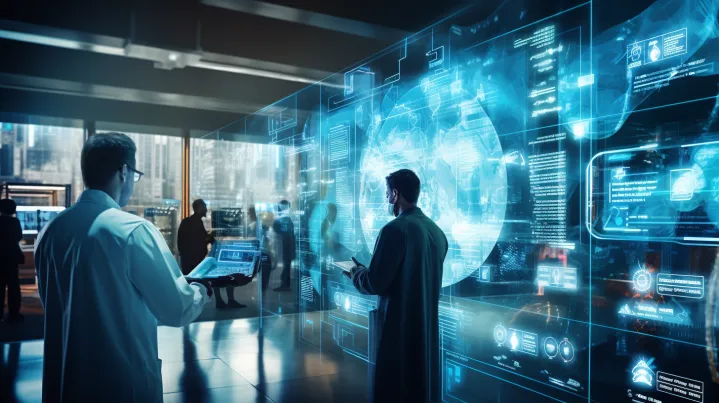Table of Contents
Dr. Darshana Sanghvi, a radiologist at Mumbai’s Kokilaben Dhirubhai Ambani Hospital, reminisces about Artificial Intelligence in Health Care in India in the early days of her practice, which began nearly twenty years ago. Back then, she relied on a team of 12 to 14 assistants who performed all tasks manually. The absence of digital information was a stark reality for her.
The MRI image statistics were captured on films, which were then displayed on a physical film box rather than a computer. This meant that every day, someone had to manually handle a hundred images, from printing the films to collecting and organizing them on the view box. Dr. Sanghvi would then examine the images and dictate the report to a typist.
Streamlining Operations: AI’s Impact on Workforce Efficiency
Finally, the report would be printed and dispatched. The entire process required a team of at least 12-14 individuals. However, times have changed, and Dr. Sanghvi now marvels at the transformation. Thanks to artificial intelligence (AI), her workload has been significantly reduced, and she now only requires a team of four individuals to handle everything.
- Patients can now request an MRI verbally, streamlining the process significantly.
- Deep learning algorithms handle image acquisition and send data for post-processing on servers, a task previously time-consuming for humans.
- Interpretation, the next phase, becomes AI’s forte, presenting complex data in a user-friendly manner with color-coded visuals.
- Artificial Intelligence in Health Care aids radiologists in swift analysis, like monitoring treatment effectiveness, reducing the arduous task of assessing lesion changes manually.
- Discrepancies due to varying post-processing techniques among doctors become obsolete with the Artificial Intelligence in Health Care standardized approach.
- Sanghvi highlights the convenience of cloud-stored data, enabling remote work for generating reports using voice recognition passwords.
- Radiology, heavily impacted by Artificial Intelligence in Health Care due to its digital nature, benefits across image processing, interpretation, and report generation.
- Artificial Intelligence in Health Care’s impact on healthcare spans diagnostics to surgeries, mimicking human cognitive abilities with or without supervision.
- Machine learning supports logical decisions by recognizing patterns in medical data, aiding medicine in diagnostics and treatment.
- Deep learning, inspired by the human brain, identifies intricate patterns for accurate insights across various data forms.
- Diabetic retinopathy (DR) screening utilizes Artificial Intelligence in Health Care as an effective tool for early detection, addressing the challenge of symptomless progression.
- Dr. Pillai leads efforts in a clinical trial network aiming to detect DR early, crucial for preventing irreversible vision loss among diabetic individuals.

AI Revolutionizing DR Screening: Improving Accessibility and Efficiency
Out of the 7,000 patients enrolled in a multi-centric registry spanning across India, approximately 5,000 individuals are diagnosed with DR. Typically, around 50 percent of these 5,000 patients seek medical attention when they experience vision impairment, as there exists a limited timeframe to intervene and avert irreversible blindness. According to Pillai, this is where the role of artificial Intelligence in Health Care becomes crucial, particularly in the initial stage of screening.
Typically, patients are required to visit an ophthalmologist who will dilate their pupils and examine their eyes to determine the presence of DR. However, according to Pillai, this process can now be simplified. By capturing a photograph of the eye and utilizing Artificial Intelligence in Health Care technology, it is possible to detect the presence of DR without the need for pupil dilation.
This advancement would significantly reduce the time required for screening. Currently, there are 25,000 ophthalmologists in India, but only around 15,000 of them can screen for DR. This number is insufficient considering the high percentage of people who have diabetes.
- AI plays a significant role in diagnosis by identifying specific retinopathy types based on morphological markers, providing diabetic retinopathy (DR) grading, and distinguishing between severe and mild cases.
- Deep learning or machine learning in Artificial Intelligence in Health Care detects nuanced details imperceptible to the human eye, especially when handling large datasets, enhancing diagnostic capabilities.
- Ongoing research by Dr. Pillai explores using retinal scans to predict heart attacks and strokes, expanding AI‘s potential beyond retinal analysis.
- AI-enabled retinal imaging forecasts cardiovascular disease and mortality, showcased in a study using an advanced algorithm, QUARTZ, to predict vascular health and mortality without blood tests or pressure measurements.
- AI-based vasculometry risk prediction is automated, cost-effective, non-invasive, and easily accessible in community settings, revolutionizing traditional diagnostic approaches.
- Artificial Intelligence in Health Care in retinal analysis detects systemic diseases beforehand, enabling early prediction of diseases years before their onset.
- Robotic assistants in spine surgery, as highlighted by Dr. Vidyadhara, collaborate with surgeons and, when combined with augmented reality, offer a comprehensive 3D perspective of the surgical site for informed decision-making.
- Dr. Patil explains Artificial Intelligence in Health Care’s role in complex cancer surgeries, aiding in identifying precise tumor margins and assisting new surgeons by comparing their actions to experts and providing real-time feedback.
The advantages for patients are immense when it comes to Artificial Intelligence in Health Care. Dr. Aditya Khemka, an orthopedic surgeon at Bhatia Hospital in Mumbai, shares the story of an 80-year-old patient who came to the hospital on a Sunday morning with a fractured dislocation of the ankle. The doctor on call recommended surgery, but the elderly patient chose to go home instead. Later that evening, the patient contacted Dr Khemka and sent X-rays that revealed a severe situation.
AI Transforming Surgical Decision-Making and Orthopedic Procedures
The fracture was compressing an artery, completely cutting off blood flow to the foot. The patient was then admitted and underwent surgery. He was discharged two days later. Dr Khemka expresses his desire for the availability of AI in diagnosing and planning treatments, making it easier for patients to comprehend and be convinced, thus avoiding unnecessary contemplation about surgery. With Artificial Intelligence in Health Care, the surgery could have been performed earlier, reducing the risk of further injury.
Additionally, Artificial Intelligence in Health Care can greatly enhance surgical decision-making and minimize the occurrence of human errors and risk factors. Dr Khemka highlights the revolutionary impact of AI-enabled robotics in orthopedic surgeries, such as knee replacements.

- Hospitals in India are yet to officially adopt Artificial Intelligence in Health Care software, with available versions remaining in the beta stage for individual use, as stated by Khemka. Centralized clinical decision-making will be possible once hospitals embrace these systems, benefiting all doctors.
- The NITI Aayog’s National Strategy for Artificial Intelligence in Health Care #AIForAll report, from June 2018, highlights AI’s potential in addressing healthcare challenges in India. Challenges include logistics, accessibility, healthcare availability, and the shortage of professionals.
- Private healthcare facilities are concentrated in tier 1 and 2 cities, requiring patients to travel long distances for services. Inconsistent healthcare quality across India exacerbates the issue, with less than 2% of hospitals accredited.
- The report emphasizes AI-driven solutions as transformative in Indian healthcare, witnessing growing involvement from corporations and startups.
- Siemens Healthineers stands out with 800+ AI-related patents. They apply AI in various applications like ALPHA for anatomical landmarks, OAR contouring in radiation therapy, and multi-modality imaging decision support.
- The Sherlock supercomputer at Siemens Healthineers’ Princeton innovation center conducts 1,200+ daily AI experiments, leveraging data in the Indian market.
- Deep learning-based OAR contouring ensures precise treatment planning, offering over 95% clinically usable outcomes.
- AI-Rad Companion by Healthineers reduces repetitive tasks and improves medical image interpretation accuracy, streamlining daily workflows.
- AI tools in 18 specialized cancer treatment hospitals aid in timely cancer identification and assessing related risks like cardiac issues or stroke.
- CHAVI, a de-identified cancer image bank collaboration between Tata Medical Center and IIT Kharagpur, facilitates oncology research by providing a vast resource of annotated cancer images.
- Indian experts recognized the necessity for datasets tailored to Indian demographics, particularly in cancer care, due to the prevalence of certain cancers like oral or head and neck cancers.
- AI algorithms under development aim to analyze pathology and radiology images, despite challenges like the lack of digitization in pathology and insufficient data in hospitals.
- Efforts at Tata Medical Center involve AI training for long-term prognostication and forecasting treatment outcomes, potentially influencing new treatment protocols.
- AI expedites treatment initiation after diagnoses, significantly reducing the timeframe, especially in lung cancer cases.
- Unique characteristics in Indian patient samples pose challenges and opportunities for AI application in cancer diagnostics and treatment planning.
- Limited electronic medical records and infrastructure for digitizing radiology and pathology in Indian hospitals hinder Artificial Intelligence in Health Care adoption, emphasizing the need for investment and improved data availability.
- The World Economic Forum predicts substantial growth in AI expenditure in India’s healthcare sector by 2025 and highlights ongoing AI applications in primary care and eye care being tested by NITI Aayog.
Revolutionizing Artificial Intelligence in Health Care
According to the report, Microsoft’s AI Network for Healthcare and Apollo Hospitals are collaborating to create a machine learning model that can enhance the prediction of heart attack risk in cardiovascular healthcare. By analyzing clinical and lab data from over 400,000 patients, this AI solution has the capability to identify previously unknown risk factors and offer patients a heart risk score, even without undergoing a comprehensive health checkup. This advancement enables the early detection of diseases.
Apollo Hospitals has implemented various initiatives to address non-communicable diseases like cardiovascular diseases, diabetes, kidney failure, and liver fibrosis. These initiatives include AI-based disease progression and risk score models. Additionally, AI machine learning and deep learning techniques are being utilized to detect clinically significant abnormalities and active pulmonary tuberculosis from chest X-ray images.
Apollo EARS (Empirical Antibiotic Recommendation System) utilizes AI to provide doctors with recommendations at the point of care, ultimately aiding in the fight against antibiotic resistance. The Clinical Intelligence Engine, developed by doctors for doctors, serves as an intuitive clinical assistant. Furthermore, the ProHealth program, powered by a predictive algorithm, evaluates an individual’s current health status, predicts potential health risks, and tailors each health check accordingly.